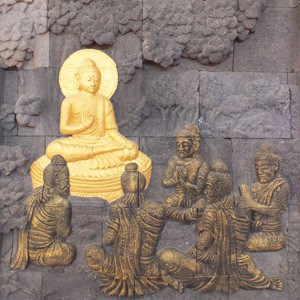Emptiness of causes and their effects
Venerable Chodron explains how ethical conduct and wisdom enhance one another for a Bodhisattva's Breakfast Corner talk.
Yesterday we were talking a bit about emptiness We were also talking about ethical conduct, and discussing the relationship between the two as one of the progressions of the three higher trainings. But there is another way to bring them together, because when we were talking about ethical conduct we’re really emphasizing cause and effect on an ethical level. What we do creates the effects that we experience in this life or in future lives.
So, this is one of the systems of causality. And causality is one of the ways that we refute the inherent existence of conditioned phenomena. We say, for example, functioning things are empty because they are dependent, and here “dependent” means dependent on their causes, because, remember, when something is dependent on causes then it can’t be an independent thing, so therefore it’s empty. If we think in terms of ethical conduct and just contemplate causality there—that the actions we do are empty then the results we experience are empty. Why? Because all of them arise dependently. It needs a little bit of unpacking because we usually think of our actions and their results as quite independently existent, and solid, and concrete.
We say, for example, “Killing is a negative action.” Where is the action of killing? Is it in the motivation? Is it in the object? Is it in your identifying the object? Is it moving towards killing? Is it the actual striking of it? Is it the other being’s dying? What exactly is the action of killing? When we start to analyze, we’ll see that the action of killing exists because we have put together a series of moments, and a series of events, and have given them that label “action of killing.” Right? Because if you said anyone of those moments in itself was killing, it would be hard to accept, wouldn’t it?
Is the action of actually hitting somebody with a weapon, is that the killing? I mean, if you forget about the motivation, you forget about the person dying, that alone can’t be killing, can it? And similarly the intention alone without the rest of it isn’t killing. The person dying and you feeling satisfied afterwards—that itself isn’t killing without the rest of it. We talk about “action of killing” as a solid thing—but actually it’s something that exists by being merely labeled in dependence upon a series of different moments.
It is the same for the action of “making an offering.” We create virtuous karma when we make offerings. Similarly, is offering the intention to make the offering? The preparation of the offering? The giving of the offering? The receiving of the offering? Is it how you feel afterwards? Is it how the other person feels afterwards? You see that there isn’t one solid “action of offering.” Offering is labeled in dependence upon many different events. All these causes are dependent, and they give rise to results. Then they go out of existence.
As soon as an action is done, that action is in the past. The action itself is not something permanent; it’s changing moment by moment. It leaves a karmic seed. It leads to a disintegration of itself. And then those seeds produce a result sometime in the future. But it isn’t that the result arrives just out of nowhere, or that the exact result is pre-programmed from the cause. It isn’t as if this cause produces exactly this result in exactly this way. No!
Because this cause may produce one aspect of the result, but other aspects of the result are produced by the other conditions—because that karmic seed can’t ripen unless there are cooperative conditions in place, too. And what those cooperative conditions are shapes the way the karmic seed ripens. So, it isn’t like cause A leads to result B, and there is no other influence involved. Cause A is changing moment by moment; it’s disintegrated. And then how that flow of energy— that disintegration—results is going to depend on all sorts of other things—cooperative conditions—that are going on at the time. And then the result also is something that occurs many, many moments later because the result is also changing moment by moment by moment by moment…
Here, what we really see is that things are not fixed and static: they’re not permanent; they’re dependent upon the causes which preceded them. They’re dependent upon the conditions that are surrounding them, and therefore they don’t have their own inherent essence that’s independent of everything else. Okay? And without an essence that’s independent of everything else—by being dependent—they’re empty of inherent existence. Does that mean that karma and effect don’t function because they’re empty? No, because we’re negating the inherent existence, but we’re not negating all existence. Cause and effect still functions, and it’s a very complicated system when you really think about all the dependently arising factors. It still functions, but there’s no inherent nature in it.
So, this is another way in which we can take our emphasis on keeping good ethical discipline and apply wisdom to it, and using the two to enhance each other. It needs a lot of contemplation. [laughter] But the more you do it, the more faith you get in the law of cause and effect—of karma and its results.
Venerable Thubten Chodron
Venerable Chodron emphasizes the practical application of Buddha’s teachings in our daily lives and is especially skilled at explaining them in ways easily understood and practiced by Westerners. She is well known for her warm, humorous, and lucid teachings. She was ordained as a Buddhist nun in 1977 by Kyabje Ling Rinpoche in Dharamsala, India, and in 1986 she received bhikshuni (full) ordination in Taiwan. Read her full bio.


